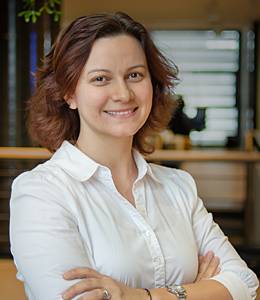Tina Nane
Most people try to steer away from uncertainty. Not so for rising star Tina Nane, who thrives on it. In high school, she thoroughly enjoyed mathematics, the beauty of solving problems and seeing the whole process. Then, after a very theoretical bachelor’s in mathematics and computer science, she took a lot of time and effort in deciding on the most suitable master’s program. She chose “Risk and Environmental modelling” at TU Delft and never left since. ‘It all seemed so magical,’ she says with a smile. ‘All these applications, having the chance to apply my knowledge.’
We are surrounded by uncertainty
No data, no problem
She now is an assistant professor in the Applied Probability Group at the Department of Applied Mathematics of the EEMCS faculty, where dealing with uncertainty is her thing. ‘We are surrounded by uncertainty,’ she says. ‘We need to navigate it, to quantify it, so we can make predictions about the future which help in the decision-making process.’ On the one hand, she develops and applies data-driven models. But her main focus is when there is no data available at all and one still wants to be able to make decisions, taking into account uncertainty. Sounds impossible, but it isn’t.
Expert judgement
Nane is an expert in the so-called “Structured Expert Judgement”, a technique developed at TU Delft by now emeritus professor Roger Cooke for rigorously assessing expert opinions as if they were data. It also applies to situations where historical data are available, but these do not carry any useful information. Think of highly volatile settings such as the stock market or sudden big events such as COVID-19.
Food- and water-borne illnesses
It is this method that Nane and her colleagues, together with the University of Florida, applied to assessing the disease burden of food- and water-borne illnesses in the USA. ‘There was no data at the national level, except for outbreaks,’ she says. ‘The University of Florida had the domain expertise; we were experts in the method. Both are crucial.’ They organized a big workshop where they gathered a diverse set of experts – diverse in expertise, background knowledge, cultural background, etc. These experts answered many questions on whether certain pathogens were more likely to be transmitted through food, water, animal contact or person-to-person. They also included calibration questions to assess the quality of the experts’ assessments – an impressive track record could, for example, be negatively correlated with the quality of an expert’s uncertainty assessments. In the end, certain disease-pathways were deemed much less likely, guiding national decisions on where to target prevention and control efforts.
Breast cancer reoccurrence
When it comes to data-driven uncertainty quantification, Nane has already applied her skills in predicting breast cancer reoccurrence. ‘Such reoccurrence has a very low probability, which is great for patients, but turned out to be not so good for the methodology we applied,’ she says. ‘That’s some theoretical research I plan to be working on.’ A next practical opportunity may come along soon as she is in contact with physicians from ErasmusMC to investigate the risk of developing radiation-induced fibrosis after breast conserving therapy for the treatment of breast cancer.
Not a niche method
Nane enjoys teaching and believes that probability and statistical literacy should be mandatory skills for any student, for a better grasp of the uncertain world that we live in. But her main ambition is to continue developing the Structured Expert Judgement methodology and to show its full potential. ‘It currently looks like a niche application,’ she says, ‘but I see its potential in a lot of applications.’ She therefore developed a MOOC on Structured Expert Judgement which, having served 6000 participants in only two runs, has already helped a lot in increasing its, her, and TU Delft’s visibility. So, if you have a problem and you have no data (or you do), who you gonna call?
Not a niche method
Nane enjoys teaching and believes that probability and statistical literacy should be mandatory skills for any student, for a better grasp of the uncertain world that we live in. But her main ambition is to continue developing the Structured Expert Judgement methodology and to show its full potential. ‘It currently looks like a niche application,’ she says, ‘but I see its potential in a lot of applications.’ She therefore developed a MOOC on Structured Expert Judgement which, having served 6000 participants in only two runs, has already helped a lot in increasing its, her, and TU Delft’s visibility. So, if you have a problem and you have no data (or you do), who you gonna call?
